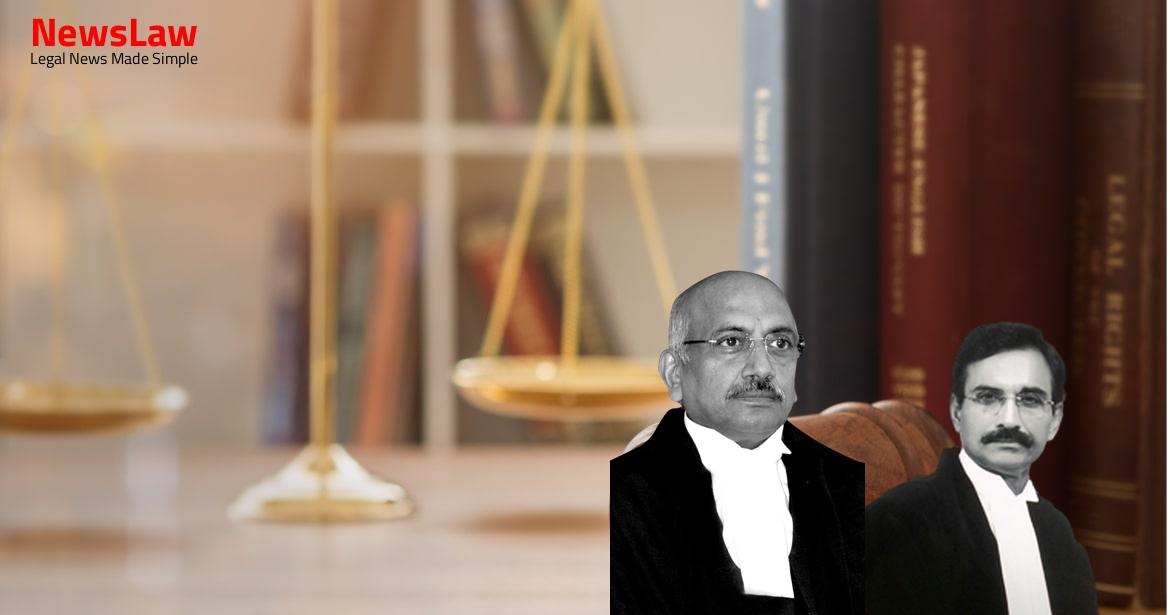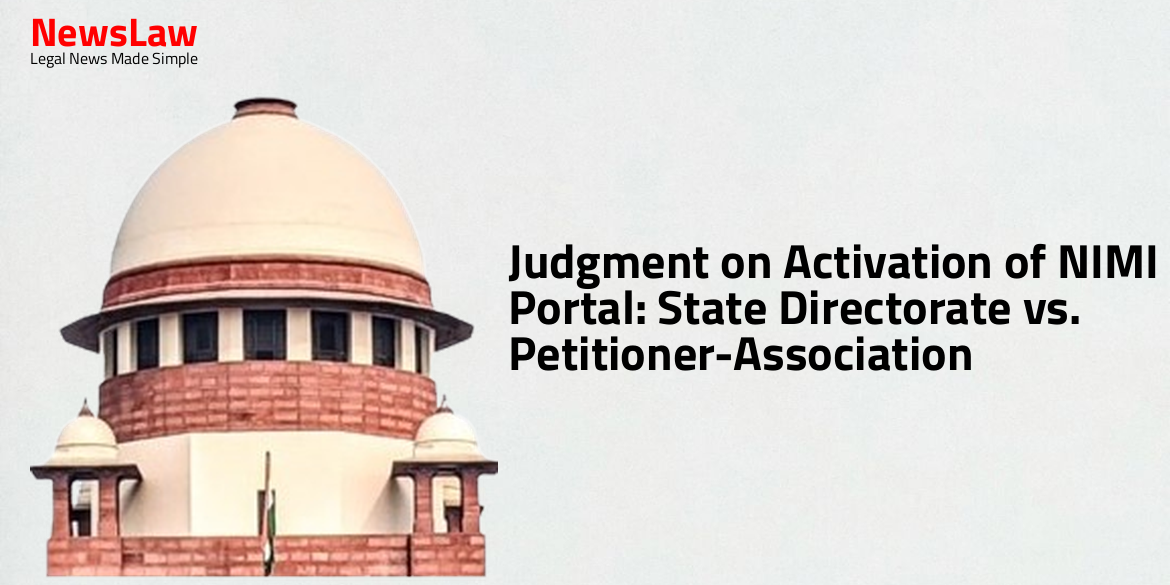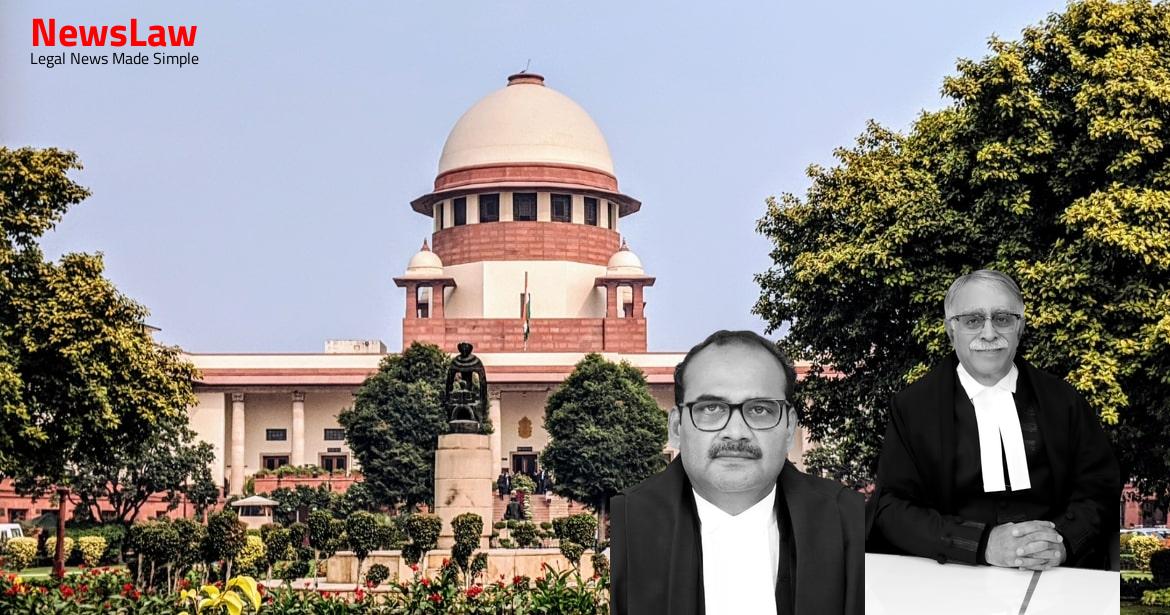In a significant legal battle over land ownership, the Supreme Court of India has upheld the specific performance decree in the case involving resolution of a land dispute. This ruling has far-reaching implications for landowners across the country, setting a precedent for future contractual disputes in the real estate sector.
Facts
- Plaintiff is continuously ready and willing to perform his part of the agreement
- Dispute arose regarding ownership of 1 cent on the southern boundary and 1/2 cent on the northern boundary
- Plaintiff alleges defendant breached the contract by withholding original title deed and not getting property measured
- Plaintiff filed a complaint with the police when defendant was elusive on the last date of the agreement
- Agreement fixed consideration at Rs.34,000/- per cent with a time limit till 24th March 2008
- Plaintiff ready to take assignment as per original document No.1405/1975
- Defendant alleged to have sent a lawyer’s notice with ulterior motive, concealing property details
- Plaintiff denied agreeing to take assignment before stipulated date, defendant insisted on full consideration for 70.950 cents of property
- Plaintiff paid Rs.3,00,000/- by cheque on 25.08.2007 as part of the agreement
- Suit for specific performance decreed by trial court but dismissed by High Court on appeal
- The trial Court found that the evidence presented by the Prosecution was insufficient to establish the guilt of the accused beyond a reasonable doubt.
- It was noted that there were discrepancies in the testimonies of the key witnesses presented by the Prosecution.
- The trial Court emphasized the importance of providing clear and consistent evidence in criminal cases to ensure a fair trial.
- Due to the lack of conclusive evidence, the trial Court acquitted the accused of all charges.
Also Read: Supreme Court Judgment on Single Till Mechanism for HRAB Calculation: A Comprehensive Analysis
Issue
- The trial Court struck the issues related to specific performance of the contract.
- The issues pertaining to the plaintiff’s readiness and willingness to perform his part of the contract were struck.
- Similarly, the issue of whether the defendant committed a breach of the contract was also struck.
- Additionally, the question of whether the plaintiff is entitled to a decree for specific performance was also not considered by the trial Court.
Arguments
- The defendant blamed the plaintiff for breach in the contract.
- In a suit for specific performance, the plaintiff is not required to have the amount in cash but must have the financial capacity to perform obligations.
- The defendant argued that the plaintiff and his family had enough resources but this contention was deemed to have no merit.
- Senior counsel highlighted that the plaintiff did not choose to examine his family members regarding their willingness to make assets available, casting doubt on the High Court’s decision.
- It was pointed out that when the plaintiff answered ‘no’ regarding producing documents to show funds, it was a denial of the suggestion that no documents were produced.
- The defendant claimed the plaintiff was not ready and willing and did not have the necessary funds, citing documents of the year 2012 and a partial payment of Rs. 5,00,000.
- Principles related to compliance with Section 16(c) regarding readiness and willingness were not properly appreciated.
- Plaintiff had sufficient capacity which was the important factor.
- Dispute centered around property extent, not financial capacity.
- Documents presented did not prove respondent’s readiness and willingness for specific performance.
- High Court erred in interfering with the trial Court’s judgment.
Also Read: Selection and Appointment of Judicial Officers in Himachal Pradesh
Analysis
- The plaintiff, PW1, and eight other witnesses were examined during the trial.
- Evidence presented regarding financial capacity and readiness of plaintiff to perform the contract.
- Documents produced included income tax returns, valuation certificates for gold ornaments, and certificates of property ownership.
- The father of the plaintiff, Gopinathan, was actively involved in the transaction.
- Contradictory claims about the measurement of property and extent found on measurement.
- Questions raised on the availability of funds and assets to meet the contract obligations.
- Importance of readiness and willingness in specific performance cases highlighted.
- The trial court found breach by the defendant and granted specific relief to the plaintiff.
- The involvement of close relatives in providing assets for the contract was examined.
- The High Court’s reversal of findings on breach and readiness questioned.
- Significance of obtaining original title deeds and production of related documents discussed.
- The trial court emphasized the plaintiff’s readiness from the time of reply notice sent during the agreement period.
- The significance of gold ornaments and cash holdings in establishing financial capacity highlighted.
- In the case of Man Kaur (Dead) by Lrs. v. Hartar Singh Sangha, the Court addressed the issue of whether the plaintiff needed to prove readiness and willingness to perform the agreement.
- The Court emphasized that a mere finding of breach by the vendor would not be enough to decree specific performance.
- The plaintiff is still required to allege and prove their readiness and willingness to perform their obligations under the contract.
- High Court erred in interfering with the decree passed by the Trial Court.
- Non-availability of bills for gold jewellery ownership not fatal to the plaintiff’s case.
Decision
- The appellant has deposited the balance amount of Rs.19,37,800/- with the Government Treasury after the judgment dated 10.06.2013.
- Interest at the rate of 6 per cent on Rs.19,37,800/- from the date of the suit (27.03.2008) till the date of deposit in the Government Treasury is to be paid to the respondents.
- The appeal is allowed, and the judgment of the High Court is set aside, restoring the decree passed by the Trial Court with modifications.
- The appellant must pay the calculated interest at 6 per cent per annum on Rs.19,37,800/- from 27.03.2008 till the date of deposit in the Government Treasury in 2013 in addition to the balance amount to be paid.
- The respondents can withdraw the balance payment of Rs.19,37,800/- along with the calculated interest on the same.
- If the amount in the Government Treasury does not accrue interest, the appellant must deposit the calculated interest within 10 weeks from today for withdrawal by the respondents.
- The conveyance deed should only be executed after the payment of interest as specified.
- Each party will bear its own costs, and any remaining balance in the Government Treasury can be withdrawn by the appellant.
Case Title: BHAVYANATH REPRESENTED BY POWER OF ATTORNEY HOLDER Vs. K.V. BALAN (DEAD) THROUGH LRS.
Case Number: C.A. No.-003336-003336 / 2019



